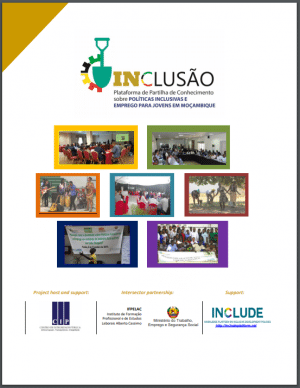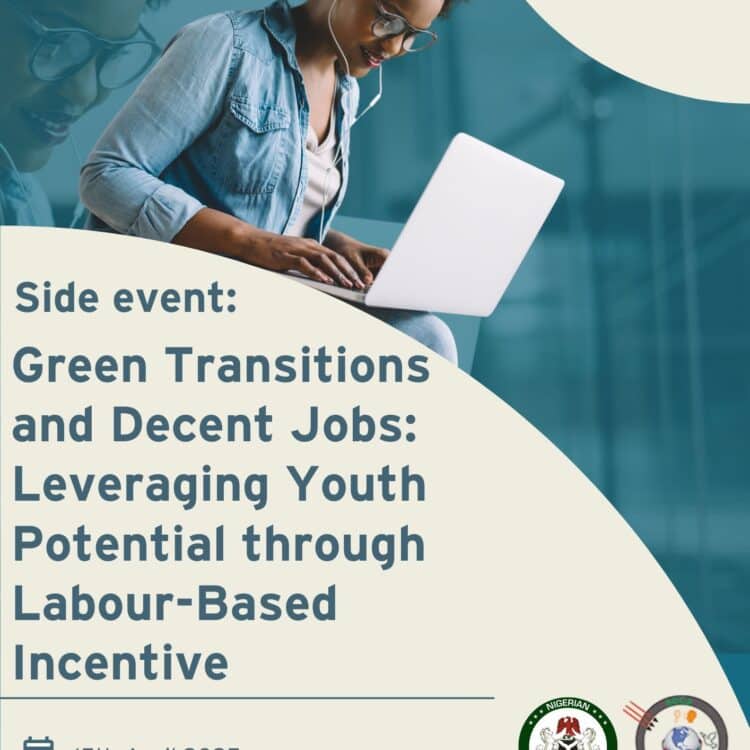
The end of project report of the African Policy Dialogue (APD) in Mozambique, referred to as Plataforma Inclusão, on youth employment in Mozambique’s extractive sector. This APD was launched in 2016 facilitateS participatory intersector dialogs on inclusive and youth employment policies in Mozambique. This report contains major project activities, five themes discussed and lessons learned. Below is a summary of the lessons learned and potential outcomes for policy.
Lessons learned
- Inclusive approach: The use of an “inclusive lens” (intersector, decentralized and participatory methods) throughout the project requires additional time to implement activities, both in terms of organizational tasks and analysis/content production.
- Governance roles: Having an advocacy NGO as the host organization of an intersector dialog project may lead to specific challenges (i.e.: combining advocacy roles with knowledge sharing/policy dialog roles) but also provides a great opportunity to all sectors involved in the dialogs to strengthen democratic intersector mechanisms.
- Partnership: the meaning of “partner” (especially at provincial level) is many times not clear and is often misunderstood as a synonym of “funder”.
- Specificities of extractive industry (IE) related activities: for its relevance any policy or project activity (i.e. seminar, field visit, etc.) related to the extractive industry companies are given priority attention by senior government representatives.
Potential project outcomes and relevance for policy dialogue
a) Potential input to the National Labour Policy Action Plan
Plataforma Inclusão may contribute National Labour Policy Action Plan by providing (among other): 1) specific/context based suggestions from young actors/youth perspectives; 2) Highlighting and providing examples on how to integrate the diverse pillars of the Policy as well as expand links to other policies and strategies (i.e.: National Development Strategy 2015-2035); 3) examples of intersector mechanisms of data gathering and analysis, linking youth employment and inclusive growth;
b) Strengthened governance mechanisms:
- Decentralization of debates (Provincial/District level participation in policy debates) was an exercise of enhancing participatory, intersector and intergenerational dialogs;
- Opportunity for policy makers to strengthen participatory democracy governance mechanisms, by carrying-out fruitful/prospective intersector discussions involving sectors that may diverge in terms of proposed strategies but share the goal of promoting inclusive growth/development;
c) Integrated strategies: Field visits to extractive Industry companies carried out by multisector teams have shown to be a good strategy to advance on integrated strategies, required to addressing interlinks among extractive industry related policy areas (inclusive growth, youth employment, gender, etc);
d) Potential “Label” on Inclusion and youth employment (based on Inquiry on Youth Employment and Inclusive Policies, implemented by the Extractive Industry.
e) Youth participation and empowerment: youth focus on dialogs have shown to be a mechanism to advance and highlight the capacity of young people to contribute to key national debates and decisions, usually restricted to “more experienced” professionals.
f) Gender integration: the gender perspective put forward during dialogs have served as a mechanism to advance on integrating gender within “macro” socio-economic issues and also to give light to sexuality related policy trends (i.e. sexual harassment as a barrier to inclusion and access to employment).
g) Enhanced creative tools for future participatory debates and promotion of access to information (Artistic contents, video and website).
h) Clarification of concepts: Dialogs contributed with examples of how “inclusive growth” (2015-2035 National Development Strategy) can be translated into concrete practices and actions oriented to including the Mozambican population (specific focus on youth) “both as beneficiaries and as producers of growth”.




